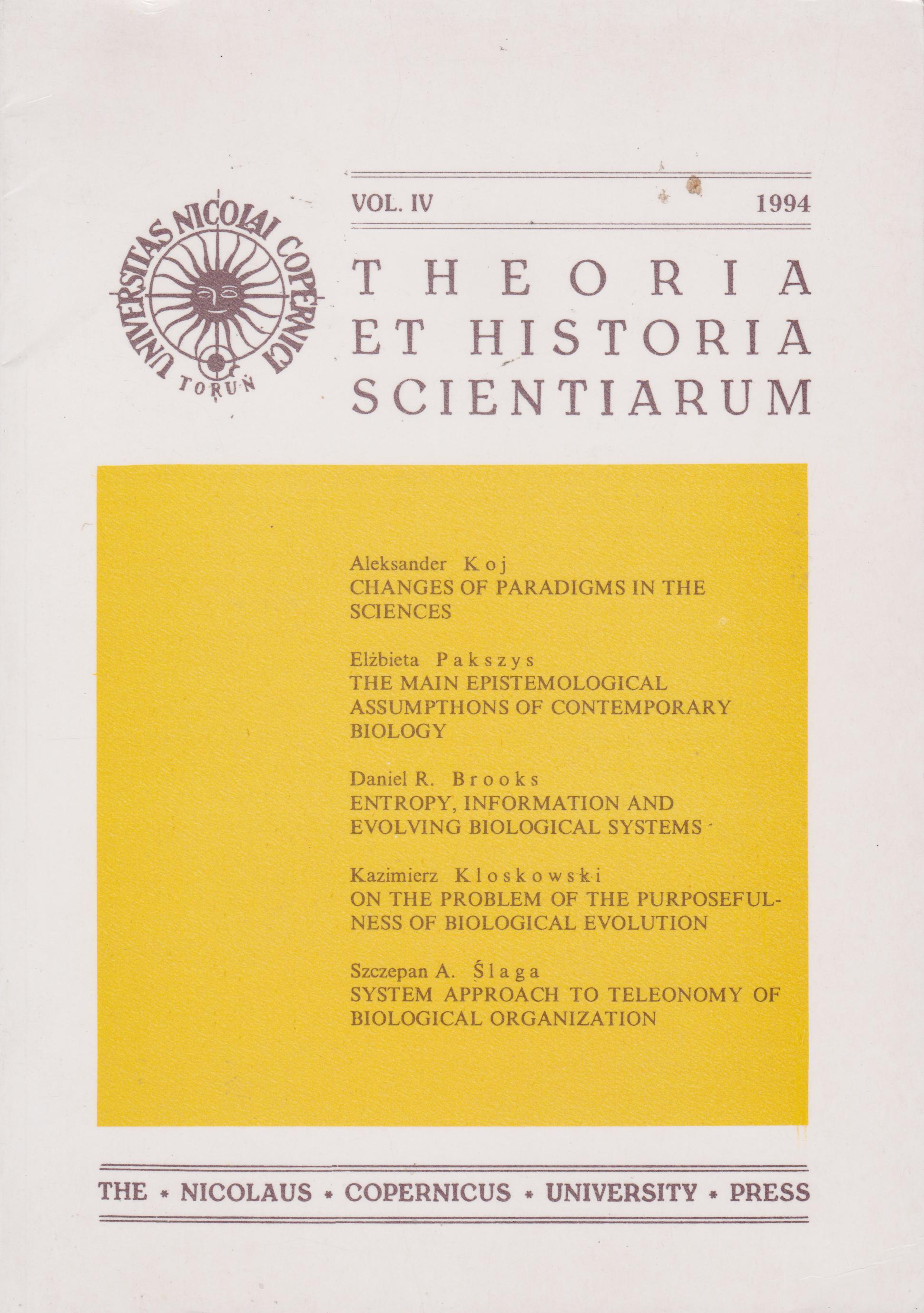The main epistomological assumptions of contemporary biology (a survey)
DOI:
https://doi.org/10.12775/ths.1994.003Keywords
epistemology, biology,Abstract
Cognitive condition of any scientific domain depends on its location among other fields of study, since relationships with the closest „neighbors” supplies, so it seems, fruitful analogies in executing the most important scientific functions: description, explanation and pre/postdiction. This way acquired interdiscip¬linary knowledge has its contribution in the ideal of objectivity, most crucial in creating the image of fully matured science. This does not mean however, that we are dealing with the relationships abandoned of any limits between different scientific disciplines today. Quite contrary, specialization, peculiarity or autonomy of study seems to be equally justified feature of every advanced research, acquired especially through different methods and interpretation, invented and applied to various objects of study. Certainly, both reciprocal currents tend to shape contemporary research in all natural history. In this essay however, I will try to indicate only these concerning biology.References
N. Bohr, 1958, Atomic Pysics and Human Knowledge, New York (in Polish: Biologia a fizyka atomowa, Warsaw 1963).
Th. Dobzhanski, 1966, Are Naturalists Old Fashioned, „The American Naturalist” (in Polish: Kartezjanskie i Darwinowskie aspekty biologii „Problemy” no 10, 1966).
M. Eigen, P. Schuster, 1979, The Hypercycle, A Principle of Natural Selforganization, Berlin- -New York.
M.Eliade, 1974, The Myth of Eternal Return, or Cosmos and History, New York.
W. M. Elsasser, 1966, Atom and Organism, A New approach into Theoretical Biology, Princeton.
N.Goodman, 1977, The Structure of Appearance, Dordrecht-Boston.
C. G. Hempel, 1966, Philosophy of Natural Science, New Jersey (Podstawy nauk przyrodniczych, Warsaw 1973).
J.S. Huxley, 1948, Evolution the Modern Synthesis, London.
Wl. Krajewski, 1977, Konieczność - Przypadek - Prawo Statystyczne (Necessity- Random - Statistical Law), Warsaw.
K.Lakatos, 1978, The Methodology of Scientific Programs, Pilosophical Papers vol. 1, Cambridge. J. Monod, 1970, Le hasard et le necessite, Paris.
A.B. NovikolT, 1945, The Concept of Integrative Levels in Biology, „Science”, vol. 101.
E. Pakszys, 1982, Wyjaśnianie komplementarne w biologii (Complementary Explanation in Biology), „Poznańskie Studia z Filozofii NaukF’no 7.
E. Pakszys, 1983, Racjonalność współczesnej biologii: redukcjonizm contra kompozycjonizm czy komplementarność (Rationality of Contemporary Biology: Reductionism vs. Com- positionism or Complementarily), „Studia Filozoficzne”, no 5-6.
E. Pakszys, 1986, Filozoficzne i przyrodnicze uwarunkowania rozwoju teorii ewolucji biologicznej (Philosophical and Naturalist Conditions in Development of Biological Theory of Evolution) in: Szkice o rozwoju nauki (Essays on Science Development), Poznań.
E. Pakszys, 1988, The Cognitive Status of the Theory of Evolution in Contemporary Biology, in: Laws and Theories in Empirical Sciences, Poznań.
E. Pakszys, 1989, The Problem of Scientific facts: „Living” Facts in the Light of Biological Theories, in Reports of the 13th Int. Wittgenstein Symposium, vol. 18.
E. Pakszys, 1992, Problemy dualizmu metodologicznego współczesnej biologii, (The Problems of Contemporary Biology Methodological Dualism) in: Nauka w świetle współczesnej filozofii, Warsaw.
E. Pakszys, 1992 a, Redukcjonizm fizyko-chemiczny współczesnej biologii (Physico-chemical Reductionism of Contemporary Biology) „Studia Metodologiczne” no 27, Poznań.
E. Pakszys, 1992 b, Probleme der Theorie biologischer Objecte, in: Zur Fragen der heutigen theorie und Method ologie der wissenschftlichen Erkennlnis, Poznan.
K. R. Popper, 1959, The Logic of Scientific Discovery, (Polish ed. Warsaw 1977).
K.R. Popper, 1984, The Poverty of Historicism, (Polish ed. Warsaw).
W. V. Quine, 1977, Facts of the Matter, American Philosophy from Edwards to Quine, Norman. M. Ruse, 1973, The Philosophy of Biology, London.
M.A. Simon, 1971, The Matter of Life, Philosophical Problems of Biology, London.
I.I. Shmalhauzen, 1975, The Factors of Evolution, The Theory of Stabilizing Selection (tansl. from Russian), Warsaw.
J.Such, 1972, O uniwersalności praw nauki (On Universality of Laws of Science), Warsaw.
A. Urbanek, 1973, Rewolucja naukowa w biologii (Scientific Revolution in Biology), Warsaw.
K.M. Zawadskij, E.l. Kolczinskij, 1977, The Evolution of Evolution, Leningrad.
Downloads
Published
How to Cite
Issue
Section
Stats
Number of views and downloads: 402
Number of citations: 0



